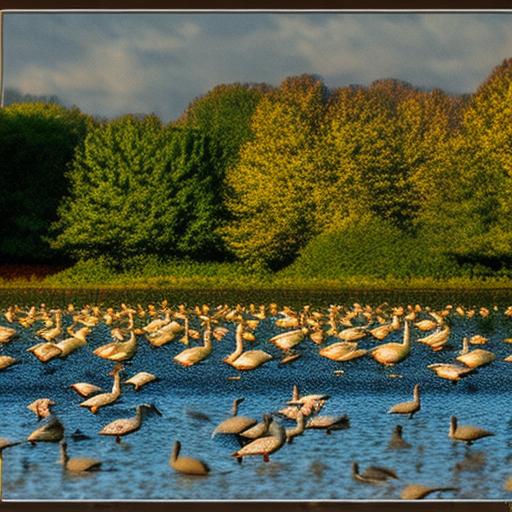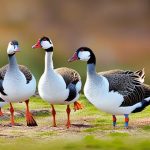Geese can be a beautiful sight to behold, with their graceful flight and elegant presence. However, when they invade your yard, they can quickly become a nuisance. Geese are known for leaving behind droppings that can be unsightly and difficult to clean up. Not only that, but their constant grazing can damage lawns and gardens, leaving homeowners frustrated and looking for solutions.
Key Takeaways
- Geese can cause damage to your yard and pose health risks to humans and pets.
- Understanding geese behavior and habits can help you effectively deter them from your yard.
- Natural deterrents like landscaping and water features can make your yard less attractive to geese.
- Physical barriers like fences and netting can prevent geese from entering your yard.
- Scare tactics and noisemakers can be effective in repelling geese, but should be used in conjunction with other methods.
Understanding Geese Behavior and Habits
To effectively manage geese in your yard, it’s important to understand their behavior and habits. Geese are social animals that mate for life and return to the same nesting sites each year. They are attracted to open spaces with easy access to water and food. This is why they often choose residential areas with ponds or lakes nearby.
The Risks and Dangers of Geese in Your Yard
While geese may seem harmless, there are risks and dangers associated with having them in your yard. Geese can carry diseases such as avian influenza and salmonella, which can be transmitted to humans through contact with their droppings or contaminated water. Their droppings can also create slip and fall hazards, especially on walkways or driveways. Additionally, geese can become aggressive when protecting their nests or young, posing a threat to homeowners and their pets.
Natural Deterrents to Keep Geese Away
One way to deter geese from your yard is by planting tall grasses or shrubs. These plants make it difficult for geese to access your yard, as they prefer open spaces where they can easily spot predators. Another effective method is using plants that are unpalatable to geese, such as yarrow or lavender. These plants have a strong scent that repels geese and makes them less likely to graze in your yard.
Physical Barriers to Prevent Geese from Entering Your Yard
If natural deterrents are not enough, you can consider using physical barriers to keep geese out of your yard. Fencing or netting can be installed around your property to create a barrier that geese cannot easily cross. This is especially effective if you have a small yard or a specific area that you want to protect. Another option is using floating barriers in ponds or lakes. These barriers create a physical barrier that prevents geese from accessing the water, making your yard less attractive to them.
Scare Tactics and Noisemakers to Repel Geese

Scare tactics and noisemakers can also be effective in repelling geese from your yard. Motion-activated sprinklers or lights can startle geese and discourage them from entering your yard. The sudden burst of water or light mimics the presence of a predator, causing the geese to retreat. Noisemakers such as air horns or whistles can also be effective in scaring away geese. The loud noise disrupts their peaceful grazing and makes them uncomfortable, prompting them to leave your yard.
The Importance of Proper Landscaping and Maintenance
Proper landscaping and maintenance can play a significant role in deterring geese from your yard. Keeping your lawn mowed and free of debris makes it less attractive to geese, as they prefer areas with tall grass where they can easily spot predators. Additionally, removing standing water can discourage geese from nesting in your yard. Geese prefer areas with easy access to water, so by eliminating any sources of standing water, you make your yard less appealing to them.
Humane Solutions for Managing Geese in Your Yard
When it comes to managing geese populations, it’s important to prioritize humane solutions. Non-lethal methods such as egg addling or relocation can be effective in managing geese populations. Egg addling involves shaking or coating eggs with oil to prevent them from hatching. This helps control the population by reducing the number of geese that are born each year. Relocation involves capturing and moving geese to a different location where they are less likely to cause problems.
Working with Local Authorities to Address Geese Issues
If you’re facing a significant geese problem in your area, it may be helpful to work with local wildlife authorities. They can provide guidance and assistance in managing geese populations. They may also have resources or programs in place to help homeowners deal with geese issues. By collaborating with local authorities, you can ensure that you are taking the appropriate steps to address the problem effectively and ethically.
Enjoying Your Yard Without Geese Interference
By understanding geese behavior and using effective deterrents, you can enjoy your yard without the interference of geese. Whether it’s through natural deterrents, physical barriers, scare tactics, or proper landscaping and maintenance, there are various methods you can employ to keep geese away from your property. It’s important to prioritize humane solutions and work with local authorities when necessary to ensure that you are managing geese populations responsibly. With these strategies in place, you can reclaim your yard and enjoy it without the hassle of dealing with geese.
If you’re tired of dealing with geese invading your yard, there’s a helpful article on Poultry Wizard that offers some effective solutions. One option is to invest in a SnapLock chicken coop, which not only provides a safe and secure home for your chickens but can also help keep geese at bay. Another interesting read on the website discusses duck mating season and how understanding this can help you deter geese from your property. Additionally, if you’re considering keeping quail, Poultry Wizard has an informative article on what vegetables quails eat, which can be useful in creating a garden that attracts quail while discouraging geese. Check out these articles and take control of your yard!
FAQs
What are the reasons for keeping geese out of your yard?
Geese can cause damage to your property, leave droppings that are difficult to clean, and can be aggressive towards humans and pets.
What are some effective ways to keep geese out of your yard?
Some effective ways to keep geese out of your yard include using physical barriers such as fences or netting, using decoys or scare tactics, and removing any food sources that may attract them.
Are there any humane methods for keeping geese out of your yard?
Yes, there are several humane methods for keeping geese out of your yard, such as using noise deterrents, planting certain types of vegetation that geese do not like, and using motion-activated sprinklers.
What should I do if I encounter an aggressive goose?
If you encounter an aggressive goose, it is best to slowly back away and avoid making direct eye contact. Do not run or turn your back on the goose, as this may provoke it further. If the goose continues to be aggressive, seek help from a professional wildlife control service.
Is it legal to harm or kill geese that are causing damage to my property?
In most cases, it is illegal to harm or kill geese that are causing damage to your property. It is important to check with your local wildlife agency to determine the laws and regulations in your area. It is recommended to use humane methods for keeping geese out of your yard.
Meet Walter, the feathered-friend fanatic of Florida! Nestled in the sunshine state, Walter struts through life with his feathered companions, clucking his way to happiness. With a coop that’s fancier than a five-star hotel, he’s the Don Juan of the chicken world. When he’s not teaching his hens to do the cha-cha, you’ll find him in a heated debate with his prized rooster, Sir Clucks-a-Lot. Walter’s poultry passion is no yolk; he’s the sunny-side-up guy you never knew you needed in your flock of friends!







